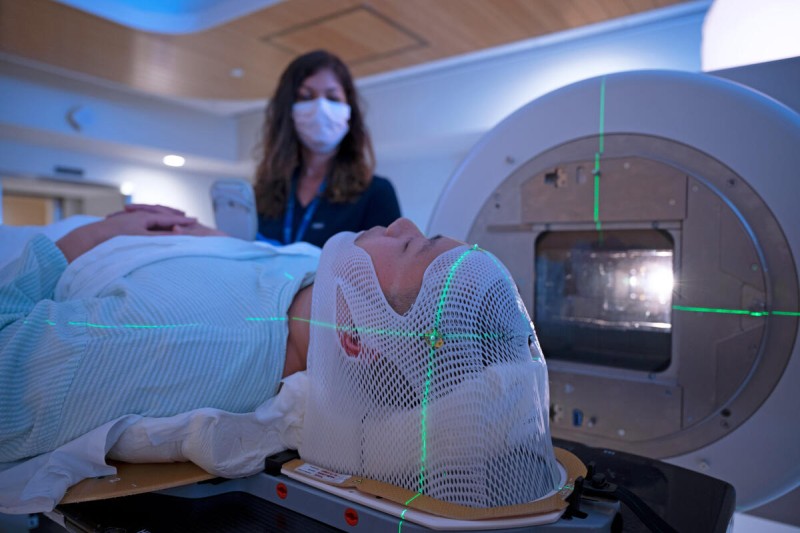
Stereotactic radiosurgery (SRS) is increasingly used to treat brain metastases. The technique uses advanced, computer-guided imaging to deliver a highly targeted and intense dose of photon radiation. Since the radiation dose conforms to the three-dimensional shape and size of the target lesion, there is minimal exposure to the rest of the brain and fewer side effects than with standard radiation techniques.
Radiation oncology, neuro-oncology, and thoracic medical oncology specialists at Memorial Sloan Kettering Cancer Center (MSK) are conducting three clinical trials of new SRS strategies for patients with lung cancer brain metastases as follows:
1. SRS in Patients with SCLC and Newly-Diagnosed Brain Metastases
This MSK-exclusive phase 2 study (NCT05419076) seeks to determine if SRS is an effective treatment for patients with up to 10 newly diagnosed small cell lung cancer (SCLC) brain metastases.
Radiation oncologist Luke R. G. Pike, MD, DPhil, Director of Brain Radiation Oncology at MSK, is the principal investigator, with co-principal investigator radiation oncologist and early drug development specialist Brandon Imber, MD, MA, Director of Brain Radiation Oncology Research and neurologist and neuro-oncologist Adrienne Boire, MD, PhD, Scientific Director of the Alan and Sandra Gerry Metastasis and Tumor Ecosystems Center at MSK.
In addition to undergoing standard SRS, all patients undergo lumbar puncture for cerebrospinal fluid (CSF) collection at study enrollment and are encouraged to have repeat collections about three months after SRS and at the time of central nervous system (CNS) disease progression. The study’s primary endpoint is the overall survival (OS) rate at six months from the start of SRS treatment.
The study seeks to enroll 62 patients and is currently recruiting patients at seven MSK locations in New York and New Jersey. Read more.
2. Three Fractionated SRS Treatments Versus One
MSK is a participating institution in a large, phase 3 trial testing fractionated SRS versus standard SRS in patients with intact brain metastases related to non-small cell lung cancer (NSCLC) and a range of other cancer types. The trial (NCT065000455), sponsored by NRG Oncology, is taking place at 99 U.S. locations.
Patients with up to eight brain metastases who have not had previous radiation therapy are randomized to receive fractionated SRS over three treatments in one week or SRS in one fraction. All patients undergo computed tomography and magnetic resonance imaging, and researchers will follow them for three years.
The primary objective is to determine whether fractionated SRS can lengthen the time to local failure compared to standard SRS. Secondary objectives include intracranial progression-free survival (PFS) and OS. The researchers will also evaluate imaging to look for differences in CNS failure patterns between the two groups.
Dr. Pike is the principal investigator, and Dr. Imber is the co-investigator of the study, which is currently recruiting patients at seven MSK locations. Read more.
3. SRS after three months of osimertinib versus osimertinib alone
Osimertinib, a selective third-generation EGFR inhibitor, is the usual treatment for EGFR-mutated metastatic lung cancer. (1) Osimertinib has excellent brain penetration but radiation is still considered for larger brain metastases. An MSK-exclusive phase 2 study is evaluating whether treating brain metastases with SRS after three months of osimertinib therapy is better than continuing osimertinib.
The primary outcome measure is intracranial PFS, assessed at three-month intervals, and the secondary outcome measure is time to CNS progression. Dr. Pike is the principal investigator, and the co-investigator is thoracic medical oncologist and early drug development specialist Helena A. Yu, MD. They will also evaluate patient-reported quality of life data.
The study (NCT06741085) seeks to enroll 56 patients and is actively recruiting at seven MSK locations in New York and New Jersey. Read more.
Read more about MSK’s research into new treatment approaches for patients with lung cancer metastatic disease: